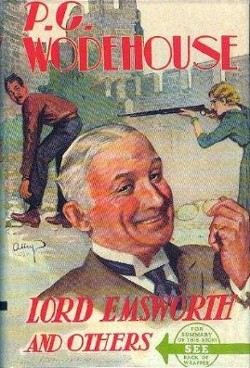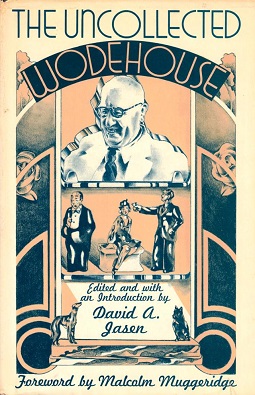Stanley Featherstonehaugh Ukridge is a fictional character in comedic stories by author P. G. Wodehouse. Ukridge appears in one novel and nineteen short stories. Ukridge is a charismatic opportunist who will do anything to increase his capital—except, of course, work. The stories in which he appears generally involve his get-rich-quick schemes. Though Ukridge never achieved the popularity of the same author's Bertie Wooster and Jeeves, Wodehouse retained a certain fondness for him, his last appearance in a Wodehouse story being as late as 1966. With completed new stories appearing over a span of 60 years, he is the longest-running of Wodehouse's characters, topping Jeeves and Wooster and the denizens of Blandings Castle.

Lord Emsworth and Others is a collection of nine short stories by P. G. Wodehouse, first published in the United Kingdom on 19 March 1937 by Herbert Jenkins, London; it was not published in the United States. The Crime Wave at Blandings, which was published on 25 June 1937 by Doubleday, Doran, New York, is a very different collection, sharing only three of its seven titles with the UK book. Penguin Books published a UK edition of The Crime Wave at Blandings in 1966. The stories in both books had all previously appeared in both British and American magazines.

A Few Quick Ones is a collection of ten short stories by P. G. Wodehouse. It was first published in the United States on 13 April 1959 by Simon & Schuster, New York, and in the United Kingdom on 26 June 1959 by Herbert Jenkins, London. The first US edition dust jacket was designed by Paul Bacon. The book's title comes from the informal phrase "a quick one", which is British slang for an alcoholic drink consumed quickly.

Eggs, Beans and Crumpets is a collection of short stories by P. G. Wodehouse, first published in the United Kingdom on April 26, 1940 by Herbert Jenkins, London, then with a slightly different content in the United States on May 10, 1940 by Doubleday, Doran, New York.

Ukridge is a collection of short stories by P. G. Wodehouse, first published in the United Kingdom on 3 June 1924 by Herbert Jenkins, London, and in the United States on 30 July 1925 by George H. Doran, New York, under the title He Rather Enjoyed It.

"Ukridge's Dog College" is a short story by P. G. Wodehouse, which first appeared in the United States in the April 1923 issue of Cosmopolitan, and in the United Kingdom in the May 1923 Strand. It features the irrepressible Stanley Featherstonehaugh Ukridge and was included in the collection Ukridge, published in 1924.

"Ukridge's Accident Syndicate" is a short story by P. G. Wodehouse, which first appeared in the United States in the May 1923 issue of Cosmopolitan, and in the United Kingdom in The Strand Magazine in June 1923, under the title "Ukridge, Teddy Weeks and the Tomato". It features the irrepressible Stanley Featherstonehaugh Ukridge, and was included in the collection Ukridge, published in 1924.

"The Debut of Battling Billson" is a short story by P. G. Wodehouse, which first appeared in the United States in the June 1923 issue of Cosmopolitan and in the United Kingdom in the July 1923 Strand. It features the irrepressible Stanley Featherstonehaugh Ukridge, and was included in the collection Ukridge, published in 1924.

"First Aid for Dora" is a short story by P. G. Wodehouse, which first appeared in the United States in the July 1923 issue of Cosmopolitan and in the United Kingdom in the August 1923 Strand. It features the irrepressible Stanley Featherstonehaugh Ukridge, and was included in the collection Ukridge, published in 1924.

"Ukridge Sees Her Through" is a short story by P. G. Wodehouse, which first appeared in the United States in the September 1923 issue of Cosmopolitan and in the United Kingdom in the October 1923 Strand. It features the irrepressible Stanley Featherstonehaugh Ukridge, and was included in the collection Ukridge, published in 1924.

The Uncollected Wodehouse is a collection of early newspaper and magazine articles and short stories by P. G. Wodehouse. First published in the United States on 18 October 1976 by Seabury Press, New York City, it contains 14 short stories. Five of the stories had appeared in the United Kingdom in the 1914 collection The Man Upstairs, and all had previously appeared in UK periodicals between 1901 and 1915; some had also appeared in the U.S. Five short items are included from 1900–1906 UK magazines, ten from 1914–1919, and nine from the U.S. Vanity Fair magazine.

"No Wedding Bells for Him" is a short story by British author P. G. Wodehouse, which first appeared in the United States in the October 1923 issue of Cosmopolitan, and in the United Kingdom in the November 1923 Strand. It features the irrepressible Stanley Featherstonehaugh Ukridge, and was included in the collection Ukridge, published in 1924.

"The Long Arm of Looney Coote" is a short story by P. G. Wodehouse, which first appeared in the United States in the November 1923 issue of Cosmopolitan, and in the United Kingdom in the December 1923 Strand. It features the irrepressible Stanley Featherstonehaugh Ukridge, and was included in the collection Ukridge, published in 1924.
"The Exit of Battling Billson" is a short story by British author P. G. Wodehouse, which first appeared in the United States in the December 1923 issue of Cosmopolitan, and in the United Kingdom in the January 1924 Strand. It features the irrepressible Stanley Featherstonehaugh Ukridge, and was included in the collection Ukridge, published in 1924.
"Ukridge Rounds a Nasty Corner" is a short story by British author P. G. Wodehouse, which first appeared in the United States in the January 1924 issue of Cosmopolitan, and in the United Kingdom in the February 1924 Strand. It features the irrepressible Stanley Featherstonehaugh Ukridge, and was included in the collection Ukridge, published in 1924.
"The Go-Getter" is a short story by P. G. Wodehouse, which first appeared in the United States in the March 1931 issue of Cosmopolitan, and in the United Kingdom in the August 1931 Strand. Part of the Blandings Castle canon, it features the absent-minded peer Lord Emsworth, and was included in the collection Blandings Castle and Elsewhere (1935), although the story takes place sometime between the events of Leave it to Psmith (1923) and Summer Lightning (1929).
Plum Stones is a set of 12 volumes of uncollected short stories by P. G. Wodehouse. All 25 stories were previously published in magazines, but not published in book form in the UK. The volumes were published posthumously between 1993 and 1995 in the UK by Galahad Books. The first two volumes were published in 1993, the following six in 1994, and last four in 1995.
Battling Billson is a 1923 short stories character by P. G. Wodehouse. He is featured in the following short stories:

"The Artistic Career of Corky" is a short story by P. G. Wodehouse, and features the young gentleman Bertie Wooster and his valet Jeeves. The story was published in the Saturday Evening Post in the United States in February 1916, and in The Strand Magazine in the United Kingdom in June 1916, as "Leave it to Jeeves". The story was also included in the 1925 collection Carry On, Jeeves.













